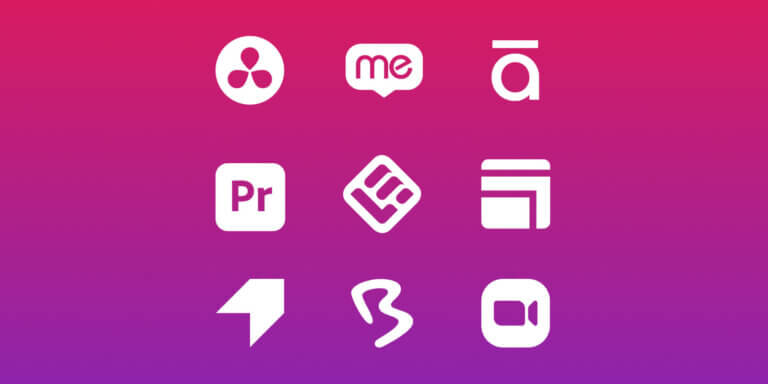Table of Contents
Customers need to feel empowered when using a product. In fact, 40% of consumers prefer self-service options over contacting support, which makes perfect sense – having customers constantly asking you questions can be frustrating for them and time-consuming for your team.
That’s where effective customer training comes in. Whether through a comprehensive knowledge base, on-demand educational content, webinars, or guided walkthroughs with Customer Success Managers, offering structured training helps users feel confident and capable.
15,000+ brands trust LearnWorlds to train their people, partners & customers.
Start a FREE TrialWe’ve already discussed the benefits of product training for customers and how it enhances the user experience, boosting customer satisfaction and loyalty. A well-designed customer training program aligned with your business goals can drive growth and ensure long-term success.
But what are the best tools to deliver this type of training? In this post, we’ll explore various customer training tools and highlight some of the top options in each category. Then, we’ll explain why a Learning Management System stands out as the most comprehensive solution.
Authoring tools are specifically designed to create engaging eLearning content, like quizzes, text, images, video, and audio, enhanced with interactive elements. Most tools are SCORM-compliant and offer templates and customization options to allow for more creativity and personalized learning experiences.
1.Articulate Storyline 360
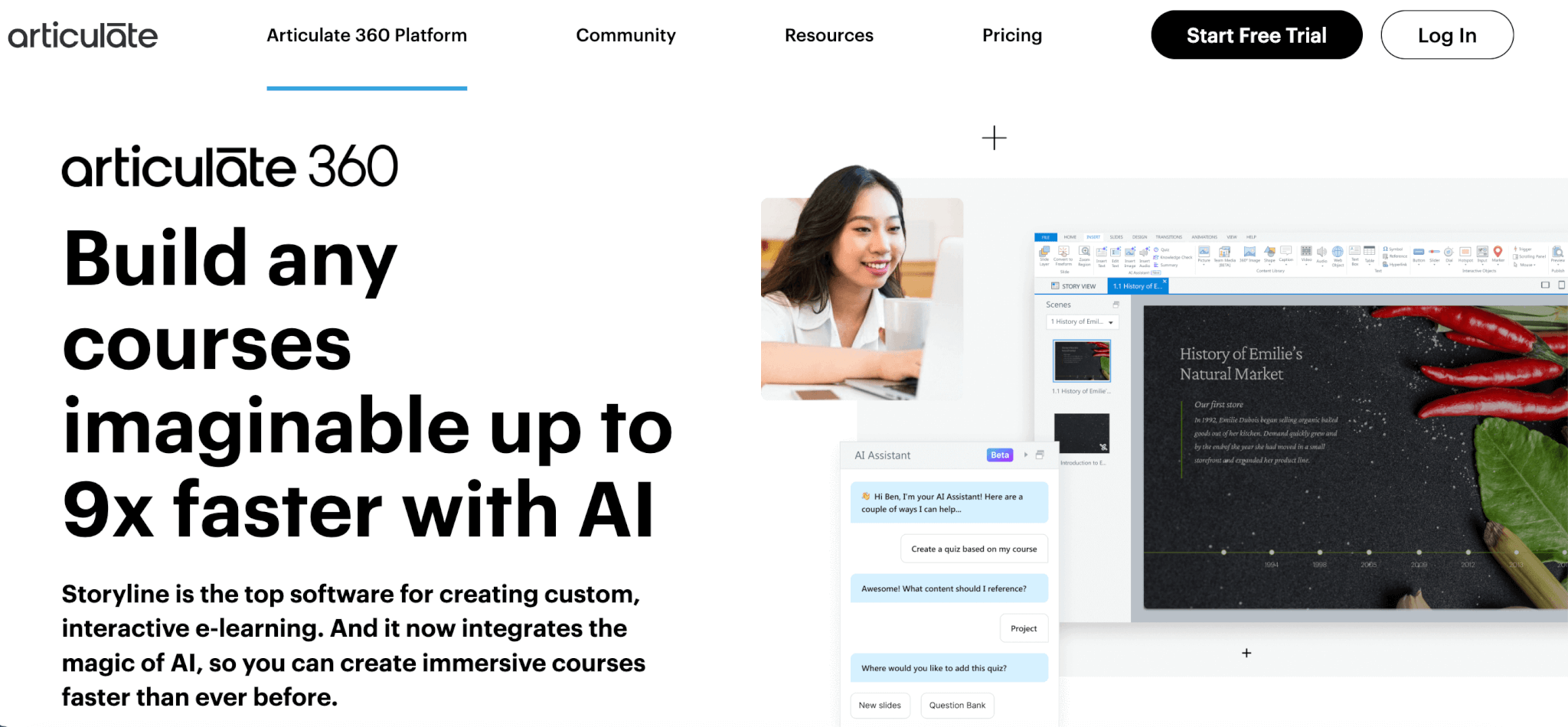
Articulate Storyline 360 allows you to create highly interactive and customizable online courses with screencasts, video, audio, simulations, and quizzes.
Its responsive design ensures content plays seamlessly across devices, while features like touchscreen gesture support enhance engagement. Storyline 360 is AI-empowered to facilitate course creation further and allows for easy collaboration among your team members.





STARTING PRICE: $1,199 per year
2. Adobe Captivate
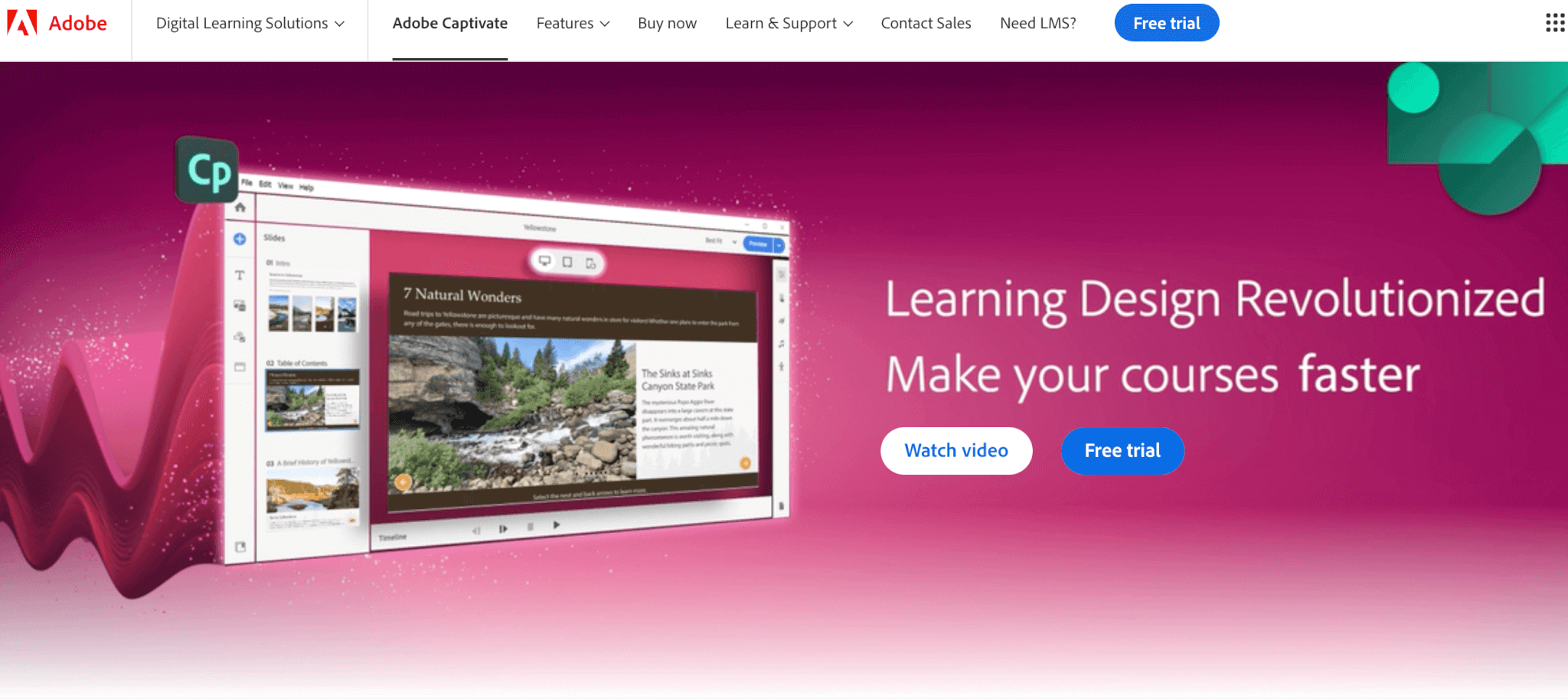
Adobe Captivate is a powerful tool that allows you to easily create immersive, interactive eLearning experiences with simplified workflows, ready-to-go slides, templates, and assets.
It supports features like Virtual Reality, widgets, simulations, and responsive design, making it great for mobile learning. It also enables your team to collaborate seamlessly with project sharing, review, and commenting capabilities.





STARTING PRICE: $33.99/month
3. iSpring Suite
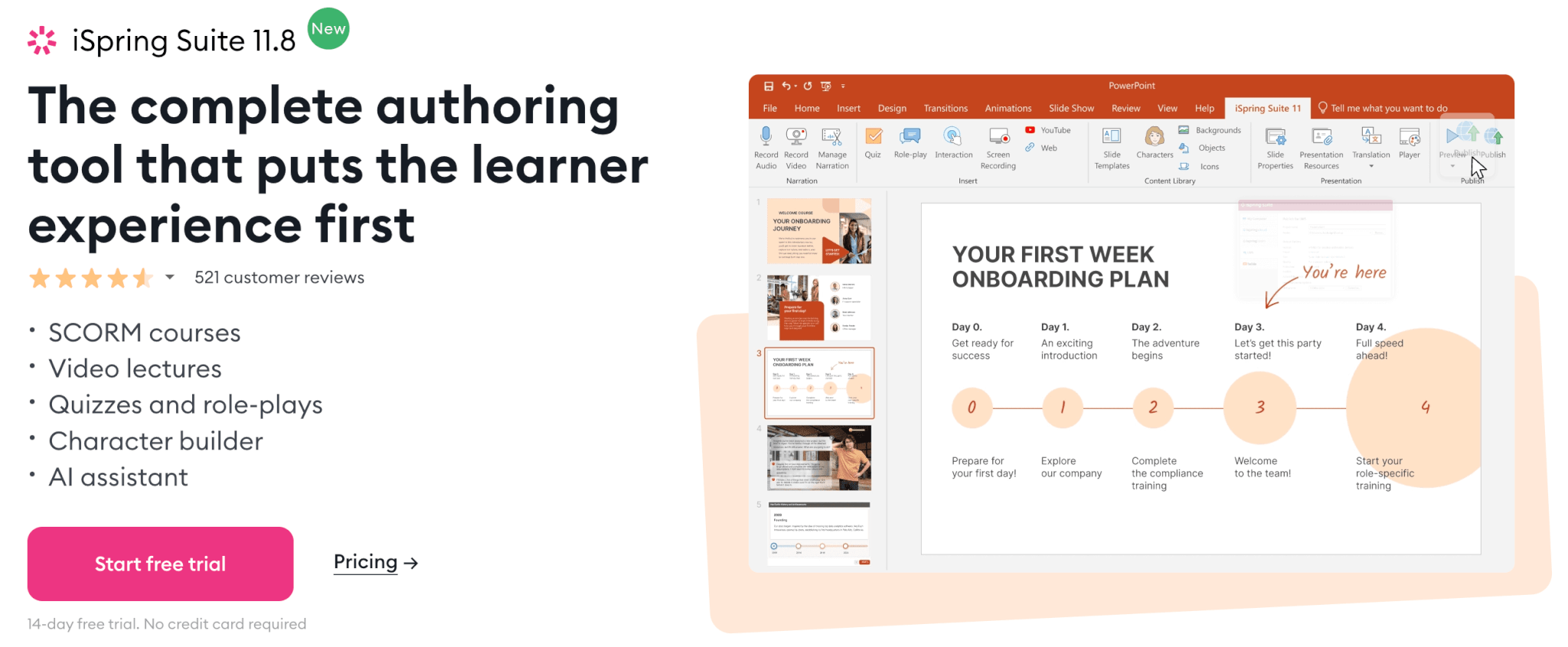
iSpring Suite is popular for converting PowerPoint presentations into SCORM or xAPI modules. It’s easy to use, yet versatile, and it’s compatible with more than 150 LMSs.
Its key features include video lectures, quizzes and role-plays, a character builder, content library with ready-made assets, text-to-speech, an adaptive course player for content that looks flawless on all devices, and an AI assistant.





STARTING PRICE: $470.00 per year
4. Lectora Online
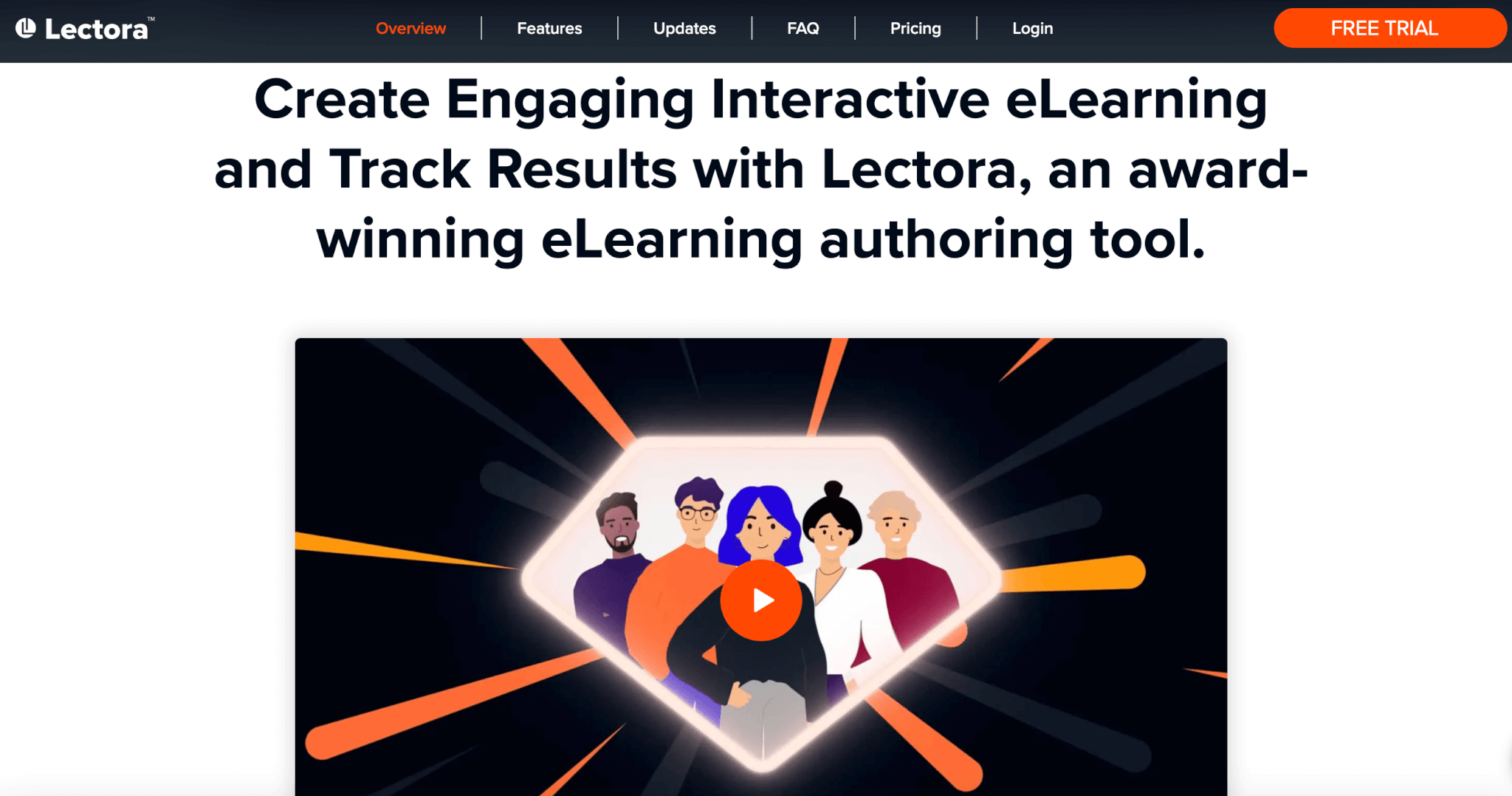
Lectora by ELB Learning is an award-winning, SCORM-compliant authoring tool known for its robust set of features that focus on accessibility.
Lectora converts PowerPoint presentations into courses and offers pre-built course logic and templates, mobile-responsive themes, interactive wireframe templates, collaborative authoring, and built-in assets.





STARTING PRICE: $1,999 per year
Your professional looking Academy in a few clicks
Start FREE TrialVideo is a powerful medium for customer training and a smooth onboarding process. The following video creation and editing tools allow you to create high-quality instructional videos, product demos, and tutorials, offering editing features, screen recording, voiceovers, and animations to make the content more engaging and informative.
5. Camtasia
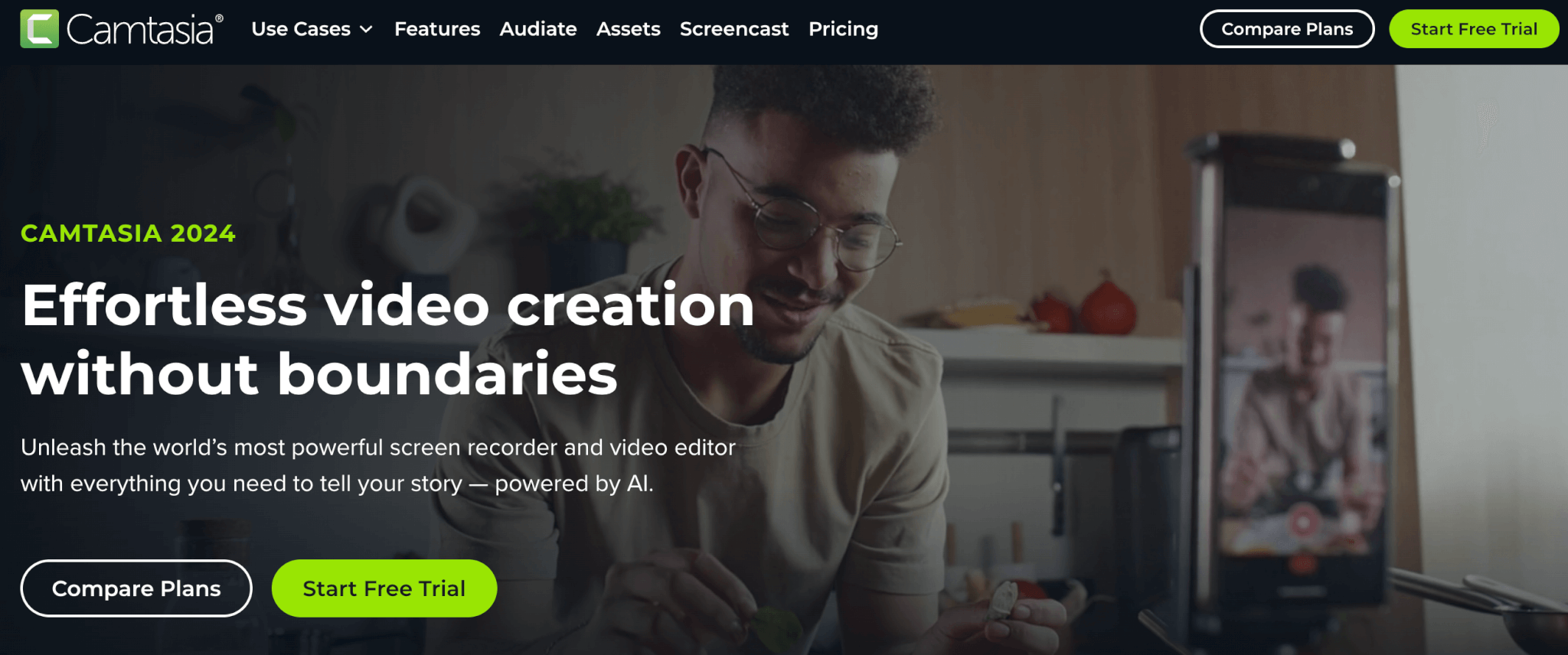
Camtasia is a user-friendly screen recorder and video editor particularly popular for creating instructional videos. This tool boasts screen capture at high resolution and frame rate, offering incredible clarity when recording your videos.
It offers annotations, transitions, ready-made assets, and easy audio integration, making it ideal for eLearning content. It’s also AI-powered, supporting AI script generation, text-to-speech, and text-based video editing.





STARTING PRICE: $179.88 per year
6. Adobe Premiere Pro
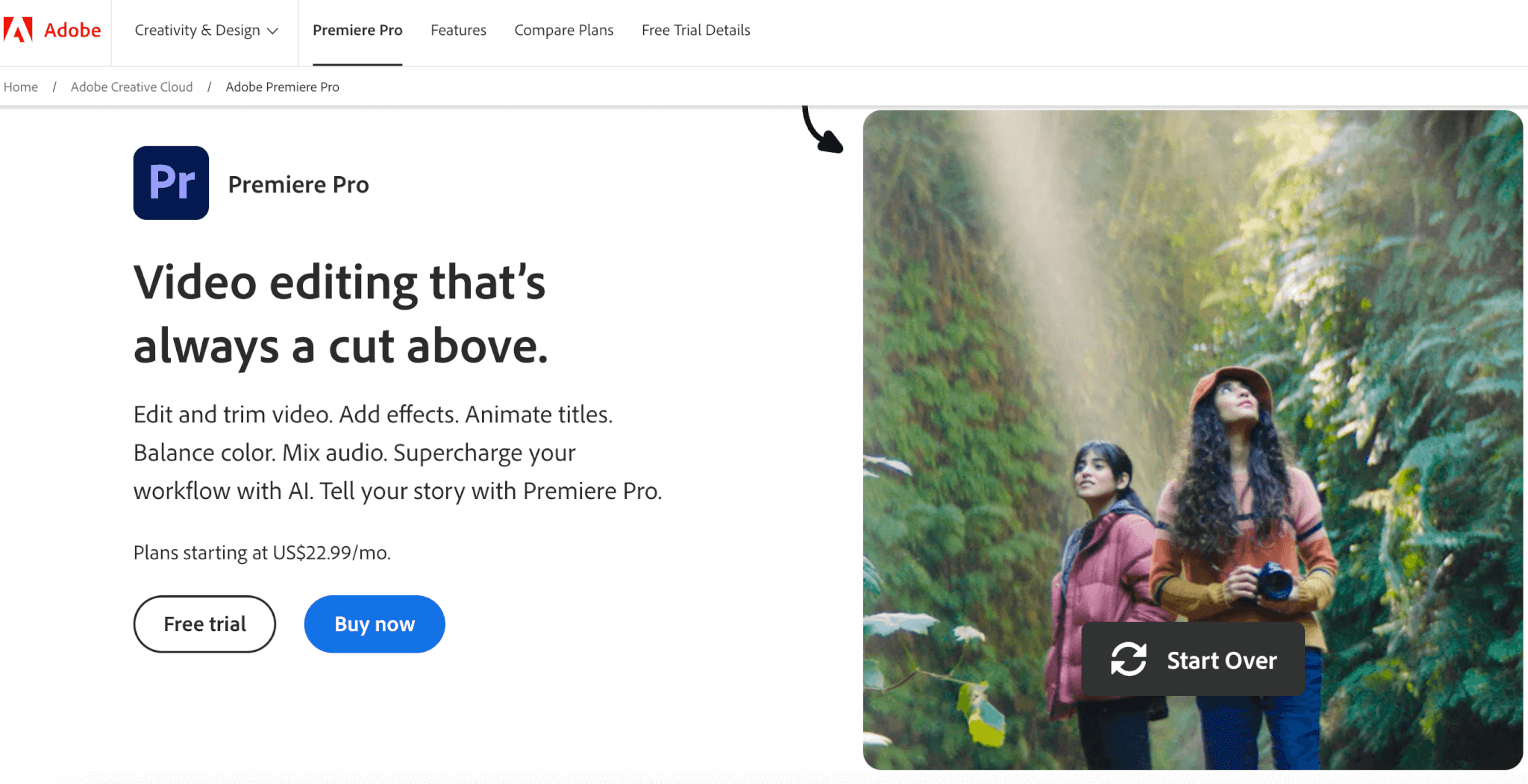
Adobe Premiere Pro is a professional-grade video editing software used by content creators and eLearning professionals alike.
It offers advanced editing features, including multi-cam editing, motion graphics, color balancing, animated titles, audio mixing, eye-catching effects and transitions, and seamless integration with other Adobe products like After Effects and AI-enhanced workflows.





STARTING PRICE: $22.99/month
7. DaVinci Resolve 19
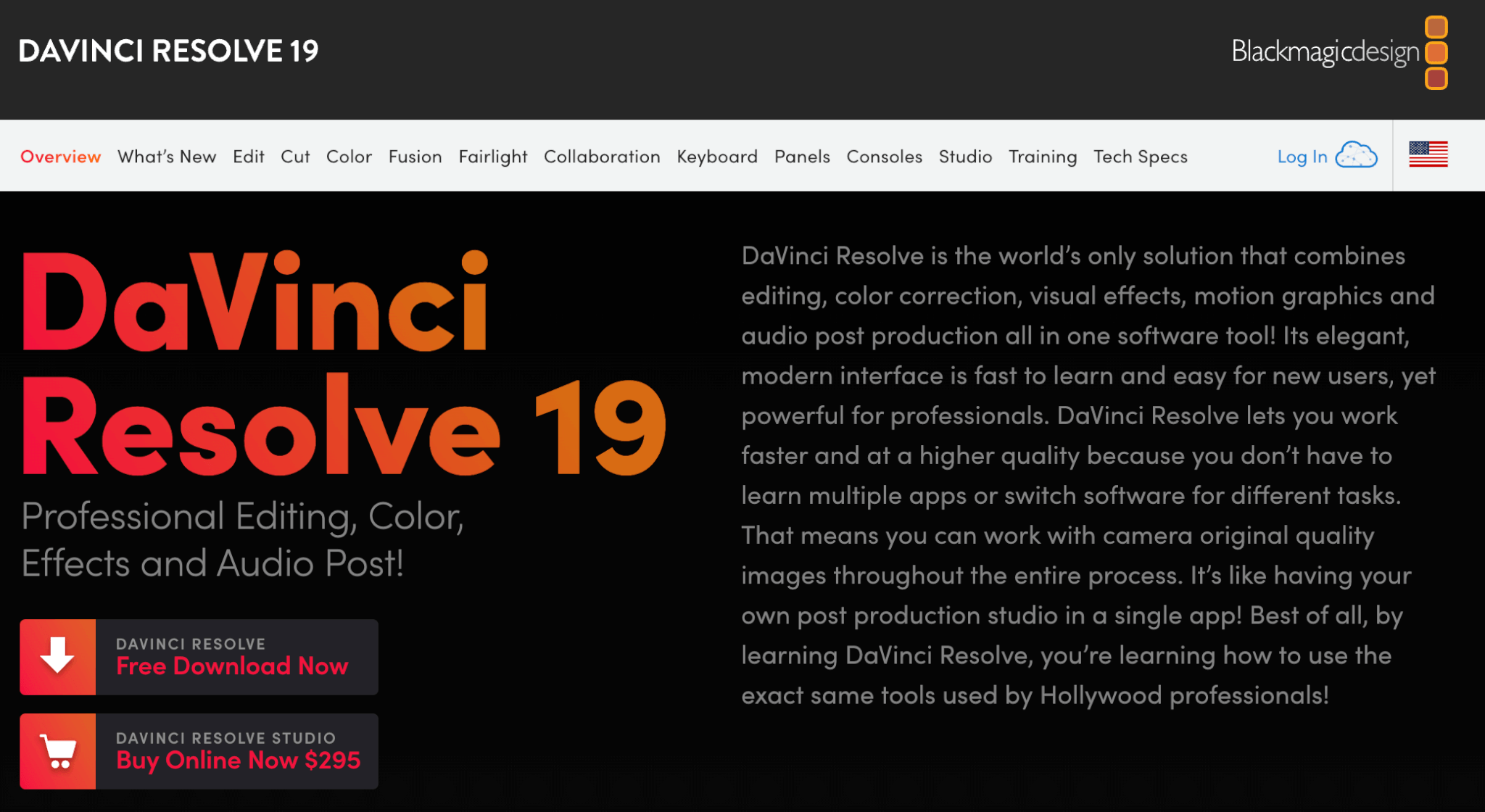
DaVinci Resolve 19 is a professional-grade video editing software that’s user-friendly, even for beginners.
It offers advanced editing tools, including multi-cam editing, motion graphics, color grading with Hollywood-level precision, animated titles, audio post-production, stunning visual effects, and seamless integration with Fairlight for advanced audio mixing. It also features AI-powered tools for enhancing workflows.





STARTING PRICE: Free
8. Animoto
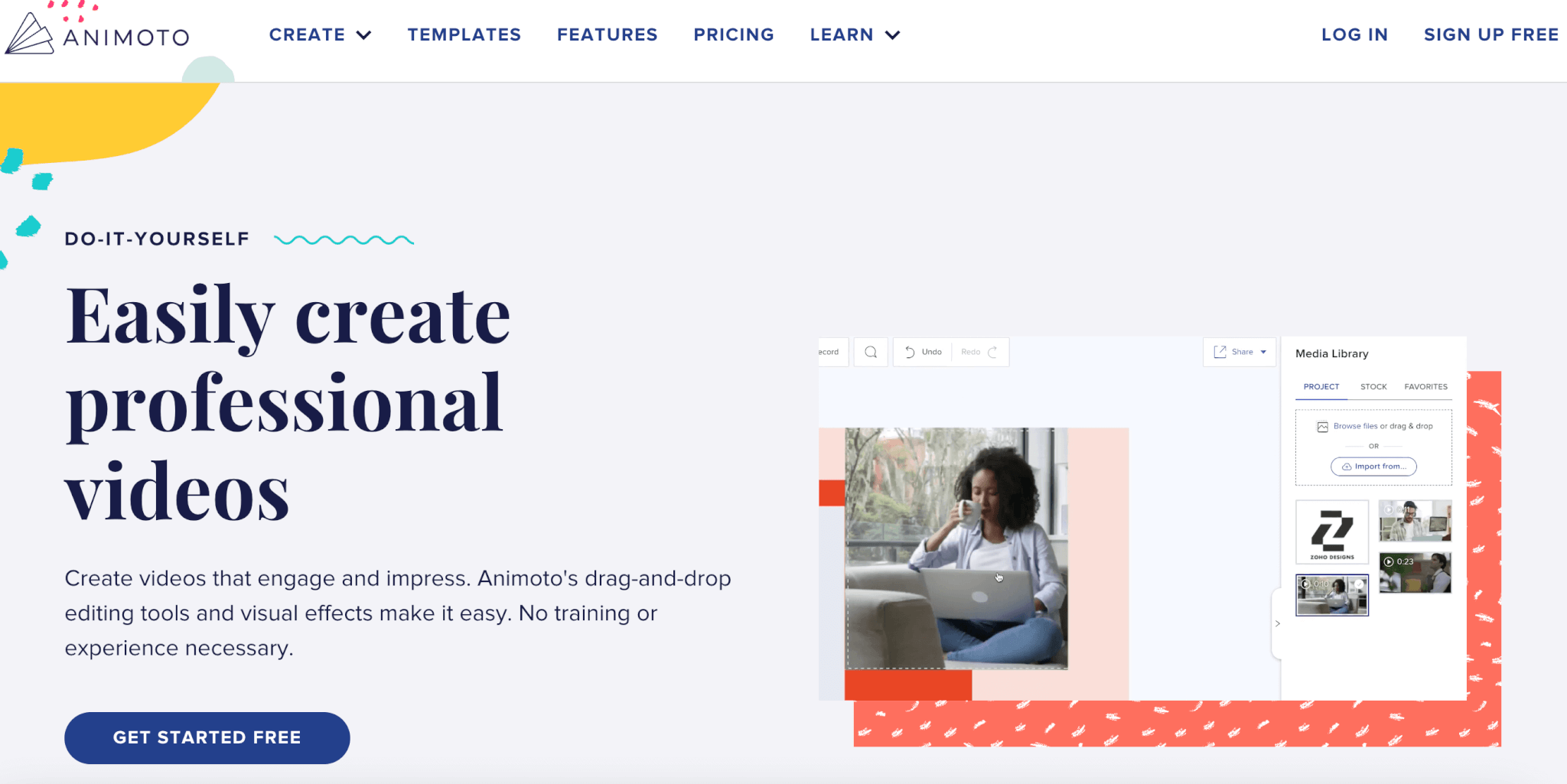
Animoto is a cloud-based video creation tool that allows users to quickly create videos using templates, stock media and music, and drag-and-drop functionality.
It’s great for producing short, professional-looking videos for eLearning without needing extensive editing skills. It also supports attention-grabbing effects, animations, transitions, and time-stamped comments for easy collaborative video creation and review.





STARTING PRICE: Free
Your professional looking Academy in a few clicks
Start FREE TrialWebinar platforms are ideal for real-time customer training sessions. You can conduct live webinars, virtual workshops, or Q&A sessions to provide interactive and personalized training.
They often include features like polls, chat, and screen sharing, which enhance engagement during live training events.
9. Zoom Events and Webinars
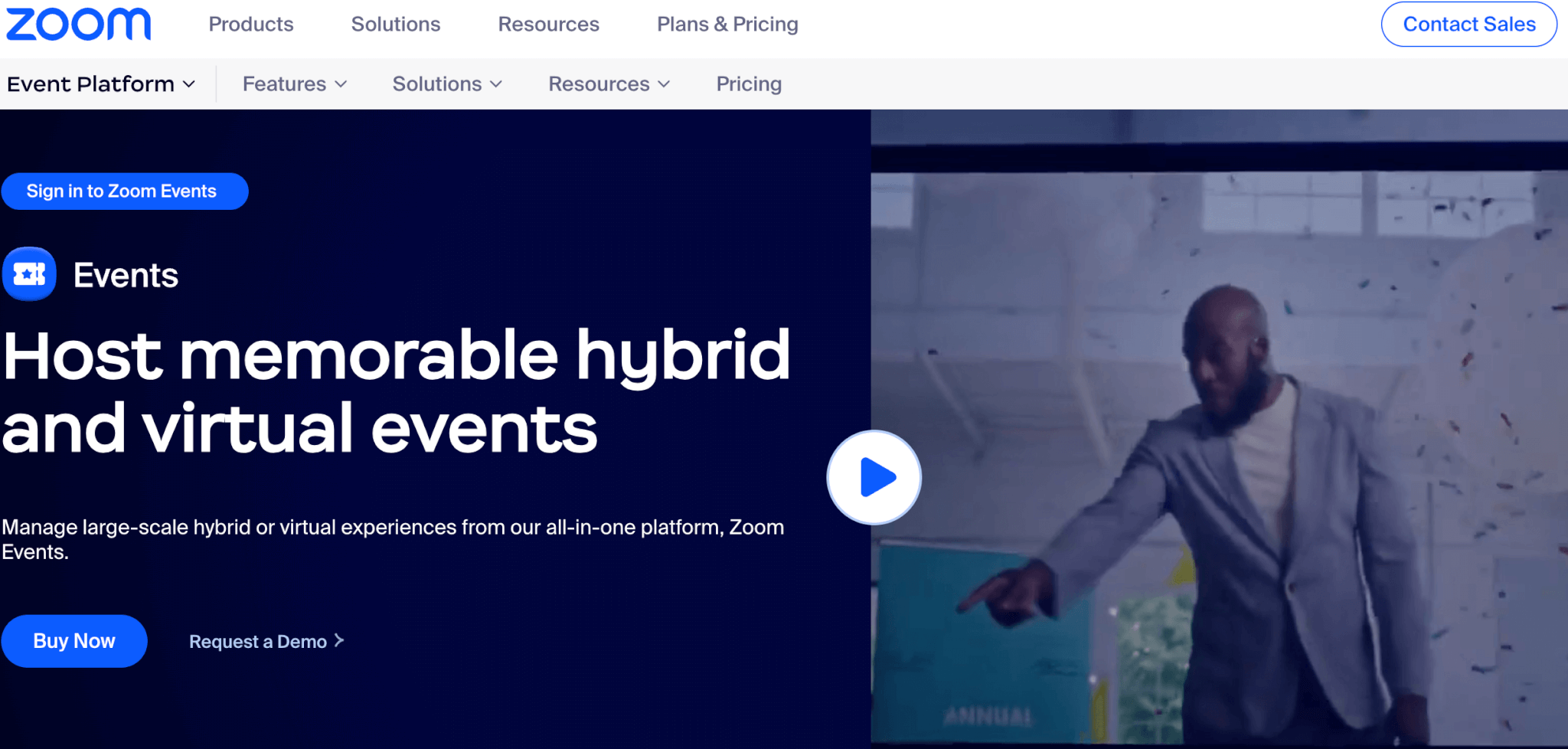
Zoom Events and Webinars is one of the most popular platforms for hybrid and virtual events, allowing for event management and branding, and facilitating networking among participants.
It offers features like screen sharing, breakout rooms, polls, and Q&A, making it ideal for interactive learning sessions. Its reliability and ease of use make it a top choice for both small and large-scale virtual events.





STARTING PRICE: Free
💁See here how to integrate your LearnWorlds Academy with Zoom!
10. GoToWebinar
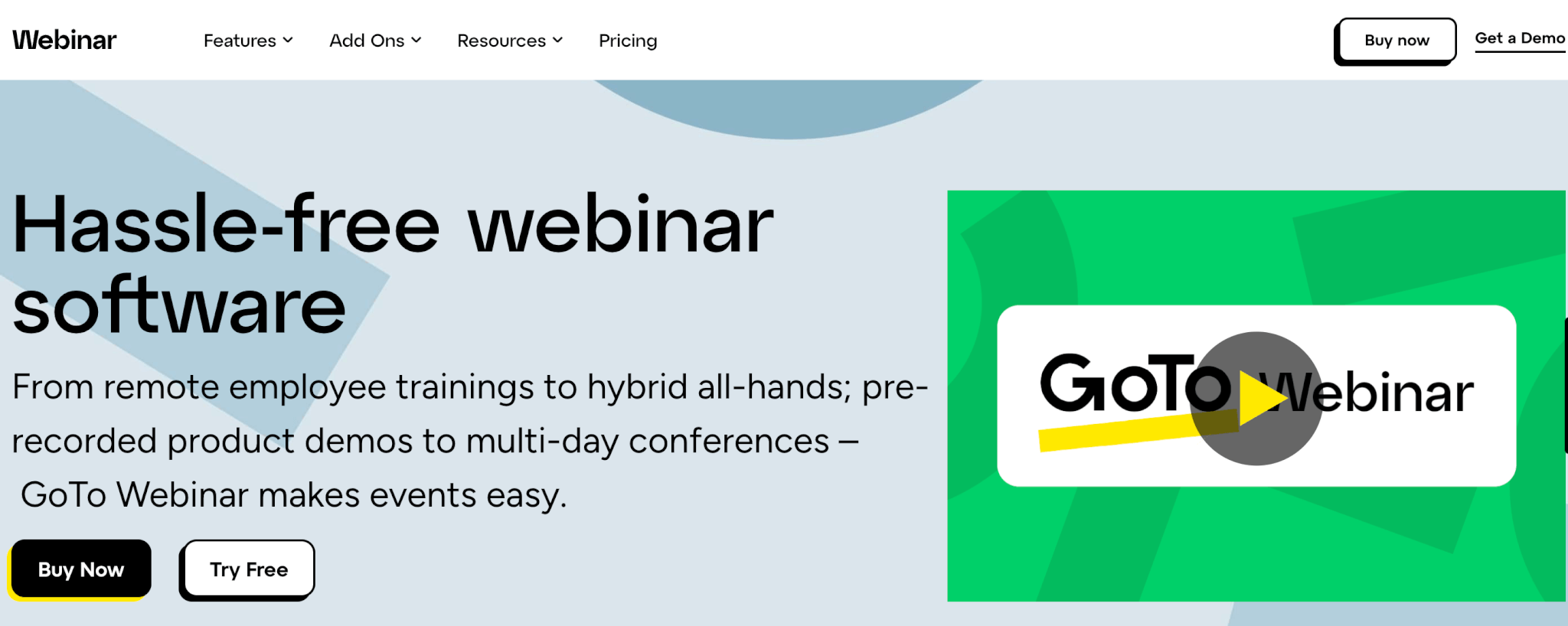
GoToWebinar is a virtual event platform widely used for online training initiatives, product demonstrations, and educational sessions.
It offers features like customizable modes, interactive features, event analytics, source tracking, powerful integrations, an audience engagement dashboard, polls and surveys, custom registration forms, and branding, allowing for seamless event organization and tracking.





STARTING PRICE: $49.00 per year
11. BigMarker
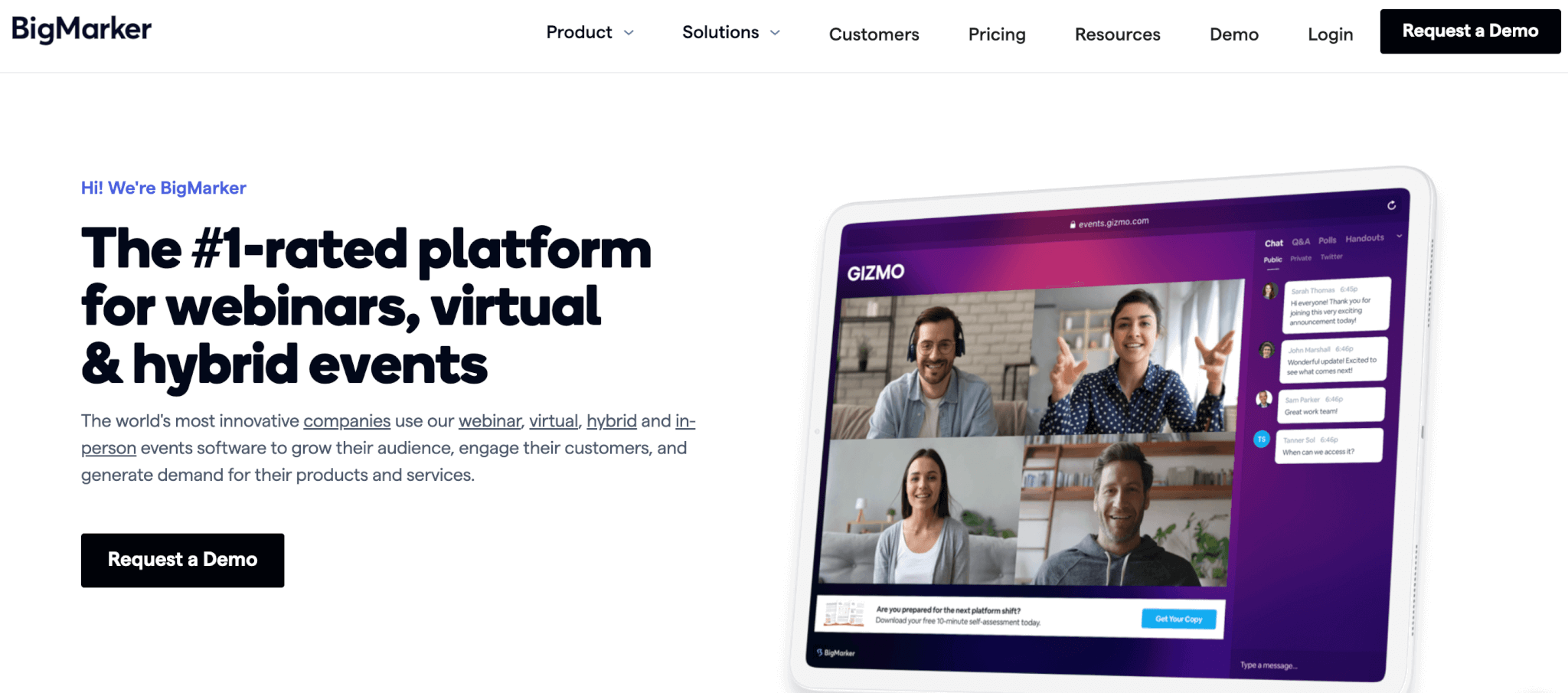
BigMarker is a comprehensive virtual event platform designed for webinars, virtual, and hybrid events.
It boasts features like advanced security and scalability, support for demand generation, pre-built landing pages, white labeling, CRM and marketing integrations, multiple webinar types, rich webinar data, breakout rooms, whiteboard, CTA popups, polls and quizzes, and attendance tracking and certificates.





STARTING PRICE: Not disclosed
12. Webex
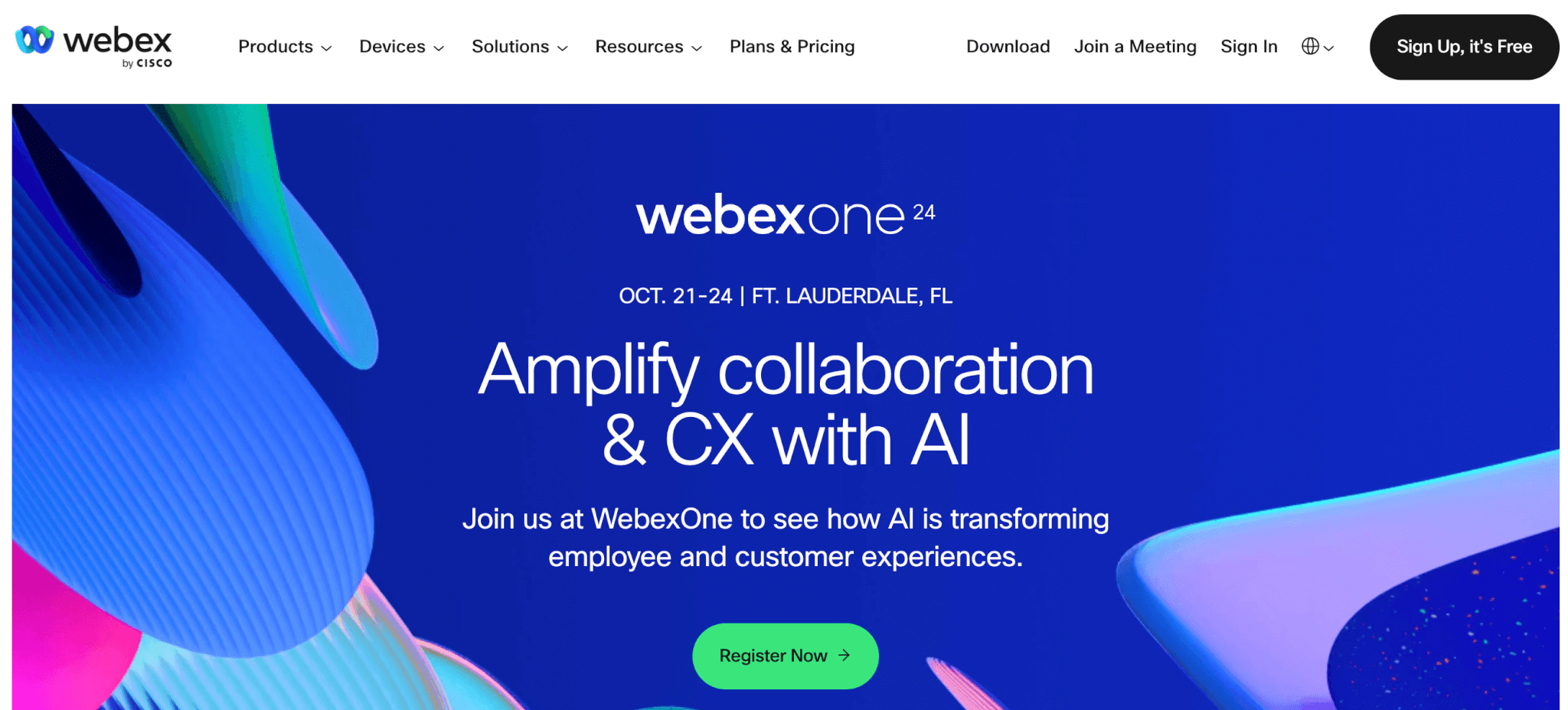
Webex by Cisco is another reliable platform for webinars and virtual training sessions, offering features such as HD video, screen sharing, interactive whiteboards, custom branding, branded registration, flexible ticketing, real-time translations, audience engagement features, and detailed analytics.
It’s particularly popular in enterprise environments and supports a variety of learning formats, from webinars to smaller group training.
💁 Do you own a LearnWorlds school or are you planning to build your online academy with LearnWorlds? Great news! Webex integrates with LearnWorlds. Check out How to Integrate Webex with your LearnWorlds School.





STARTING PRICE: Free
Your professional looking Academy in a few clicks
Start FREE TrialThese tools are designed to help customers learn while using your product or service. They provide step-by-step walkthroughs, tooltips, and in-app guidance, making them excellent for onboarding new customers. These guided experiences can help customers understand your product’s features without needing one-to-one walkthroughs or formal training courses.
13. WalkMe
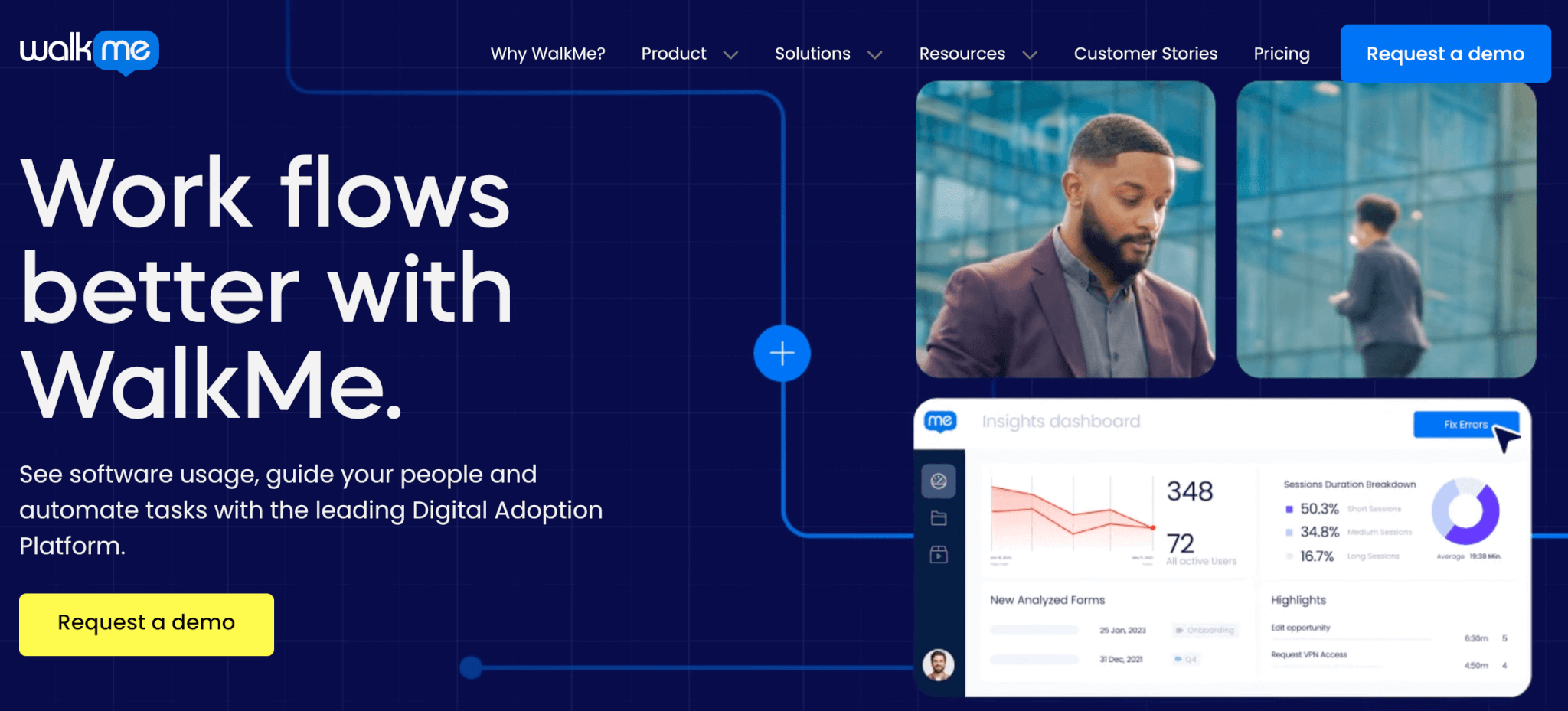
WalkMe is a leading digital adoption platform that identifies where workflows break and provides interactive walkthroughs and in-app guidance for a frictionless user experience.
Its conversational interface facilitates self-service and enables customers to find information, automate processes, and complete tasks faster, taking a load off your support team’s plate. Other notable features include in-depth analytics and time-saving workflow automations.





STARTING PRICE: Not disclosed
14. UserGuiding
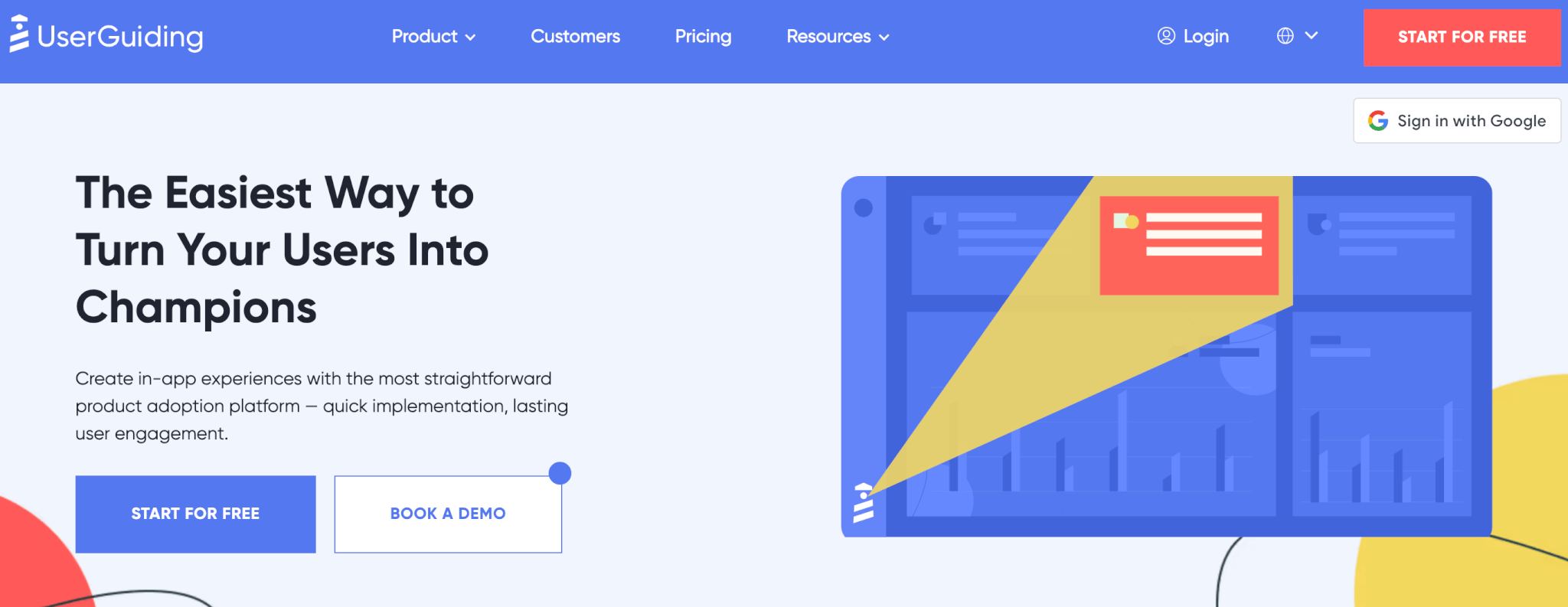
UserGuiding is an intuitive tool that allows companies to create interactive product tours, knowledge bases, onboarding flows, checklists, hotspots, announcement modals, product updates, and in-app messages without needing technical skills, with a 15-minute one-time setup.
It’s ideal for onboarding new users and ensuring they understand key features. UserGuiding additionally offers customer base segmentation, product usage analytics, in-app surveys, and various integrations.





STARTING PRICE: $89.00 per month
15. Pendo
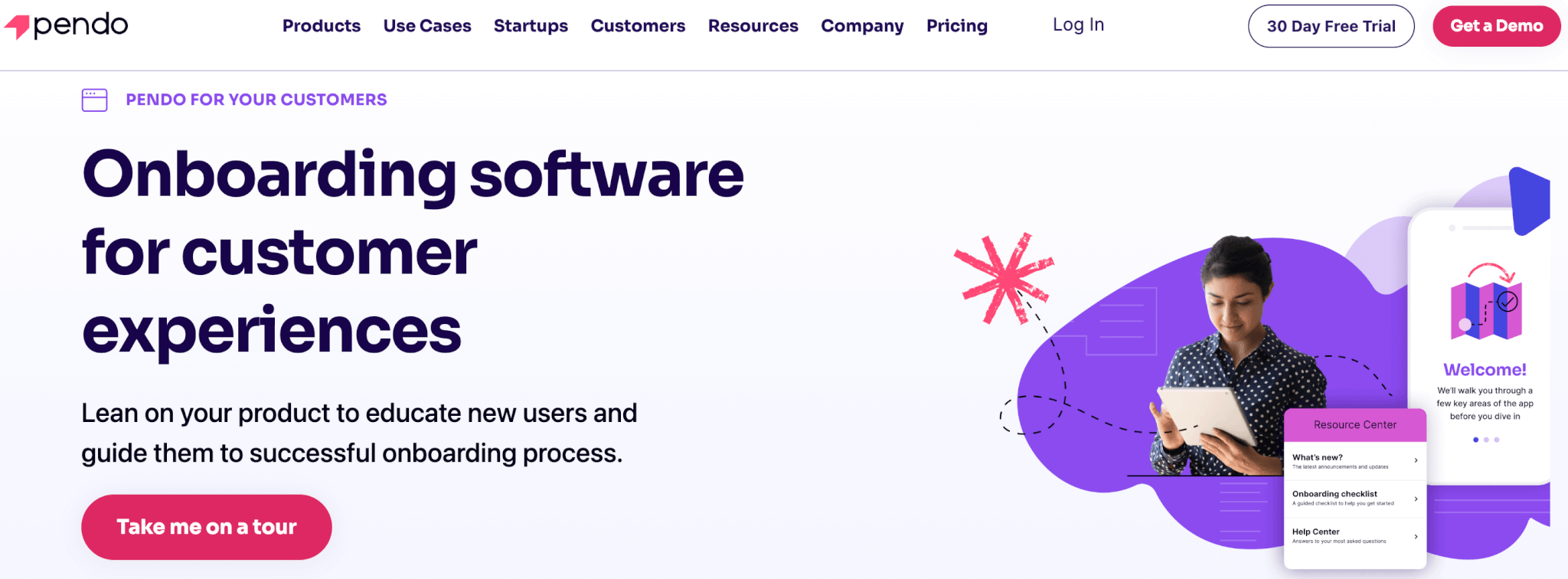
Pendo is onboarding software that combines product analytics with in-app guidance for a smooth, successful onboarding process. It allows teams to create custom product tours, tooltips, and surveys to enhance the user experience and ensure users can make the most of the product.
It also enables you to personalize training and add more complex tasks as users build proficiency and gain confidence through personalized in-app communications.





STARTING PRICE: Not disclosed
16. Userpilot
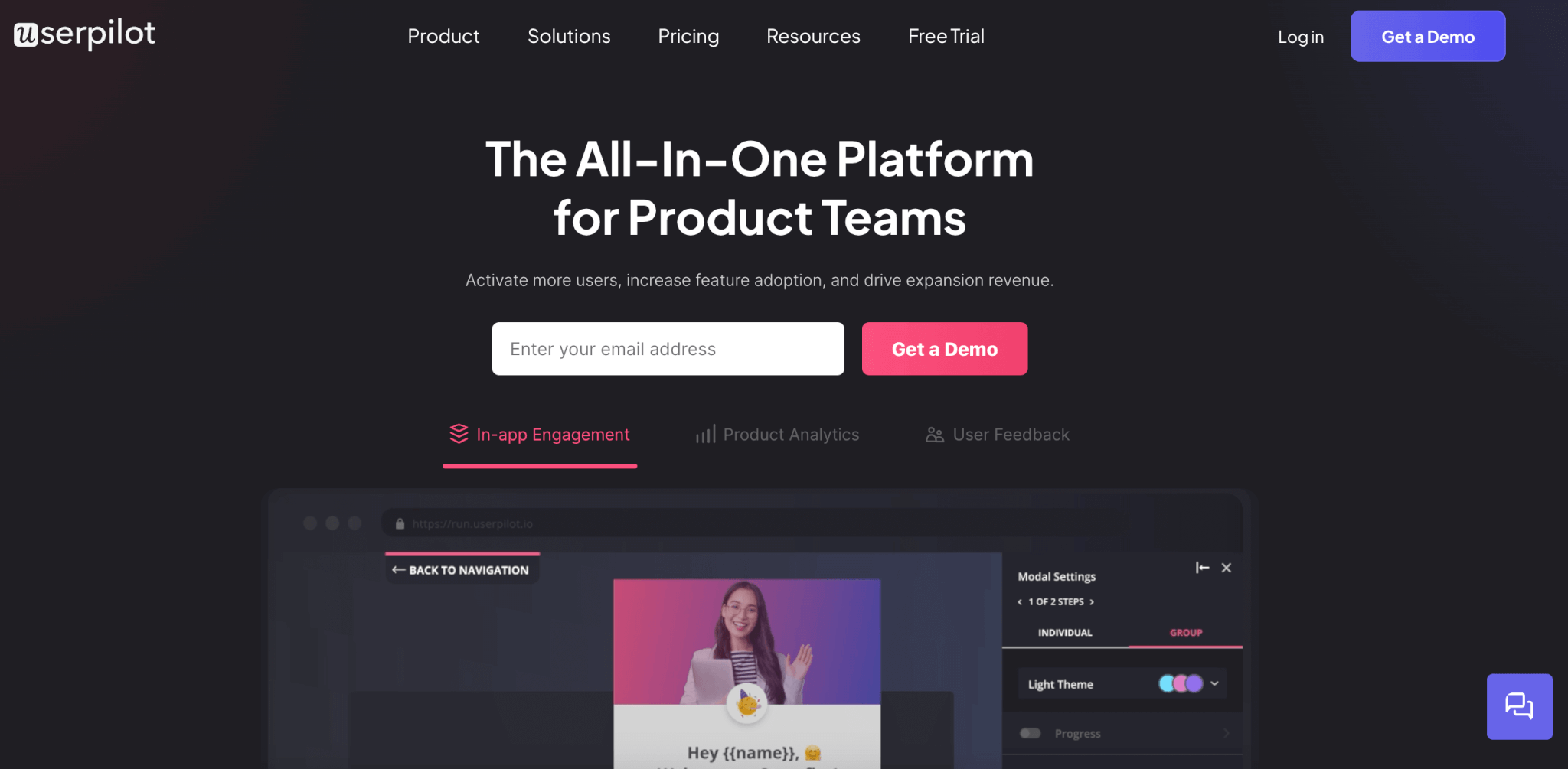
Userpilot is a powerful product adoption tool focused on enhancing user onboarding through personalized in-app experiences. It enables teams to create code-free and personalized onboarding flows with product tours, checklists, banners, and tooltips that guide users through key features, improving engagement and helping users get the most out of the product from the start.
It also generates product analytics to understand user behavior across the product journey and utilizes feedback tools.





STARTING PRICE: $249.00 per month
LMS platforms are essential for building structured customer training programs. They offer course creation features that allow you to design and organize lessons, modules, quizzes, and certifications. Many LMS platforms also support multimedia content, making it easier to create diverse learning experiences for customers. They also support multiple use cases, including employee training, customer enablement, and partner training. (But more on LMS benefits in a bit!)
17. LearnWorlds
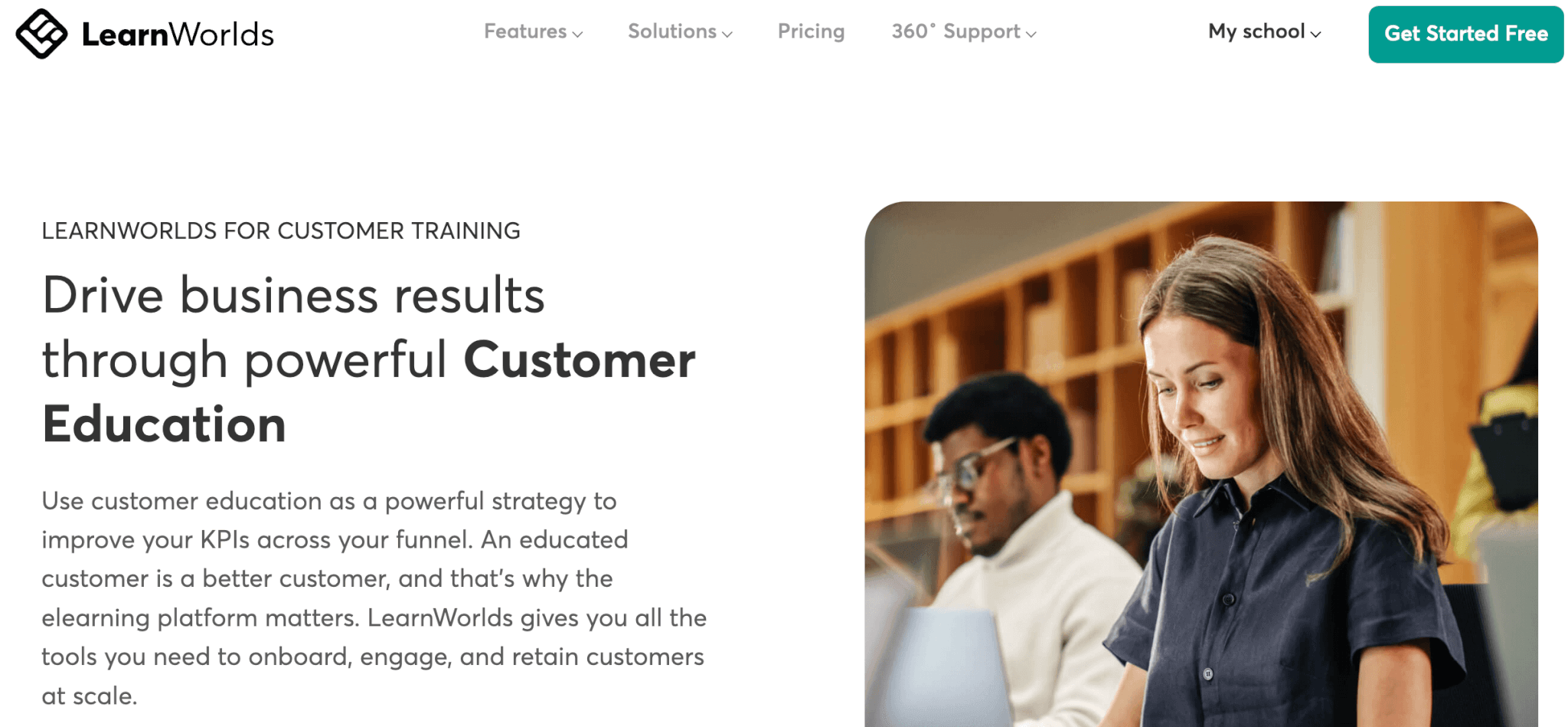
LearnWorlds is the best customer training platform offering powerful built-in tools for creating interactive, engaging training content, metrics on learner progress, course performance, and sales, certifications, and eCommerce functionality. Its white-labeling options and marketing tools make it a top choice for businesses aiming to monetize their customer education.
Some standout features include:





STARTING PRICE: Not disclosed
15,000+ brands trust LearnWorlds to train their people, partners & customers.
Start a FREE Trial18. Gainsight
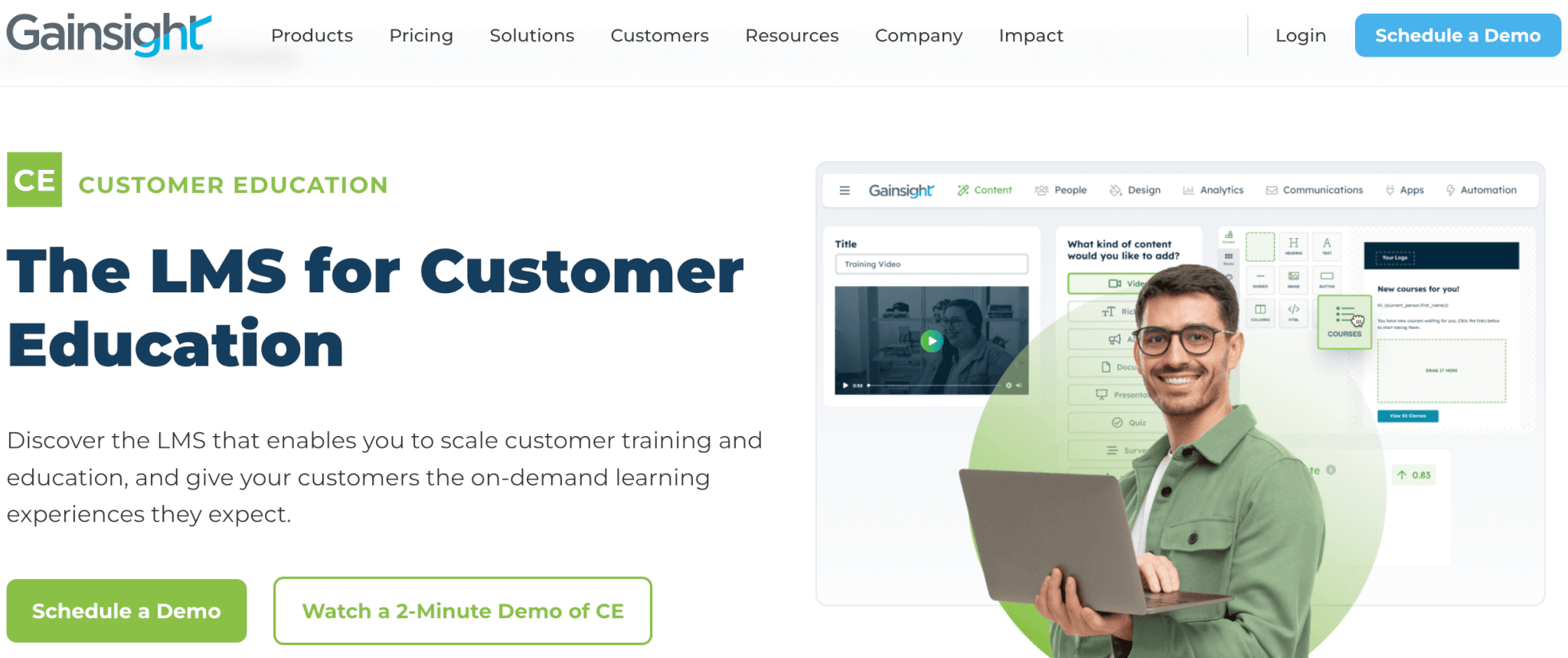
Gainsight Customer Education is designed specifically for creating customer education programs. It offers a streamlined, user-friendly interface with strong integrations, making it easy for companies to train customers effectively and track learning performance.
Other notable features include a built-in media library and downloadable videos.





STARTING PRICE: Not disclosed
19. Skilljar
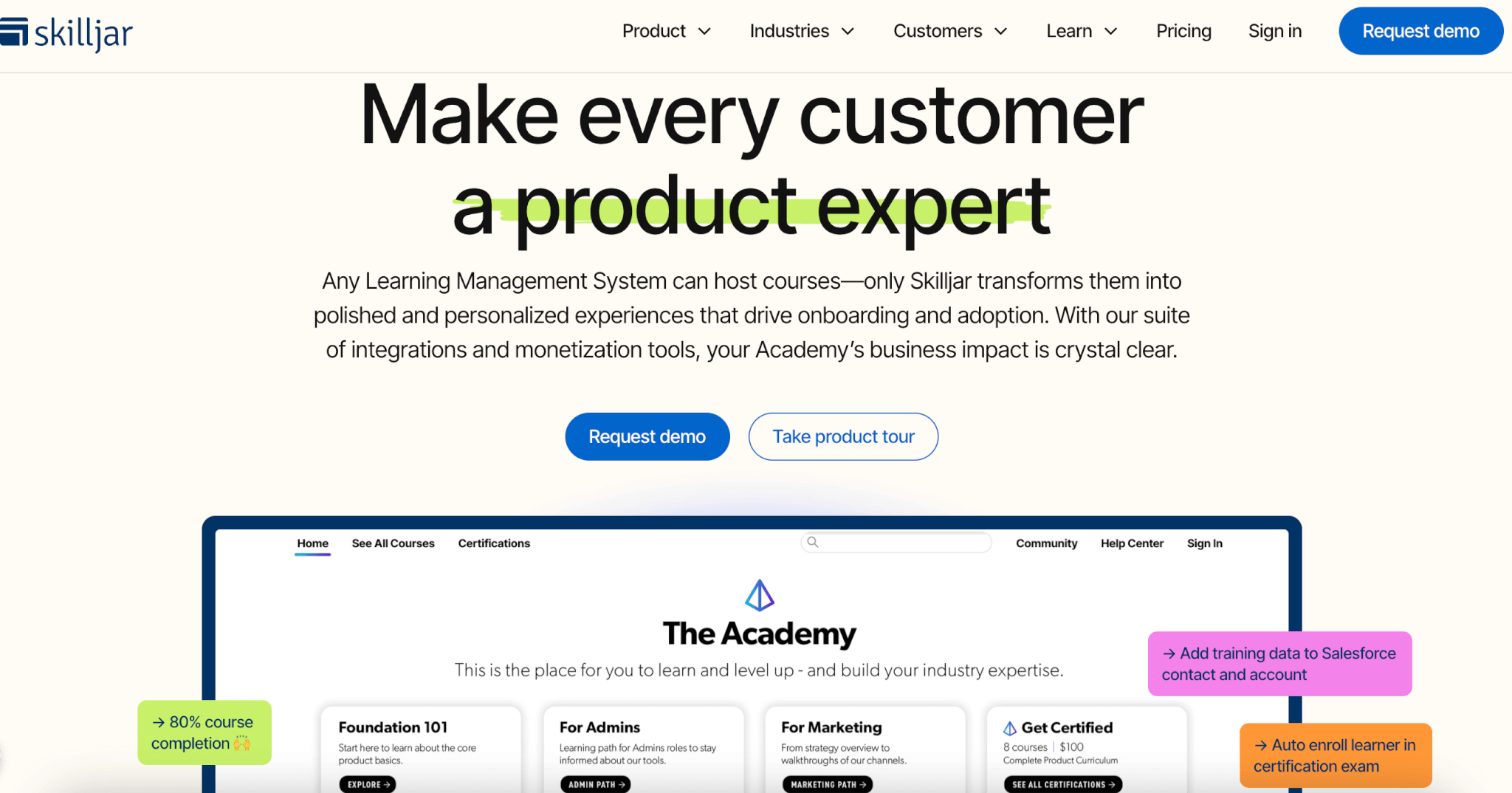
Skilljar is one of the leading training software built specifically for customer onboarding, product training, and certification. It integrates well with CRM platforms like Salesforce, and its analytics tools are tailored to customer success teams, making it ideal for tracking the impact of training on customer retention.
Skilljar also offers eCommerce capabilities and features advanced assessment & certificate builders.





STARTING PRICE: Not disclosed
20. TalentLMS
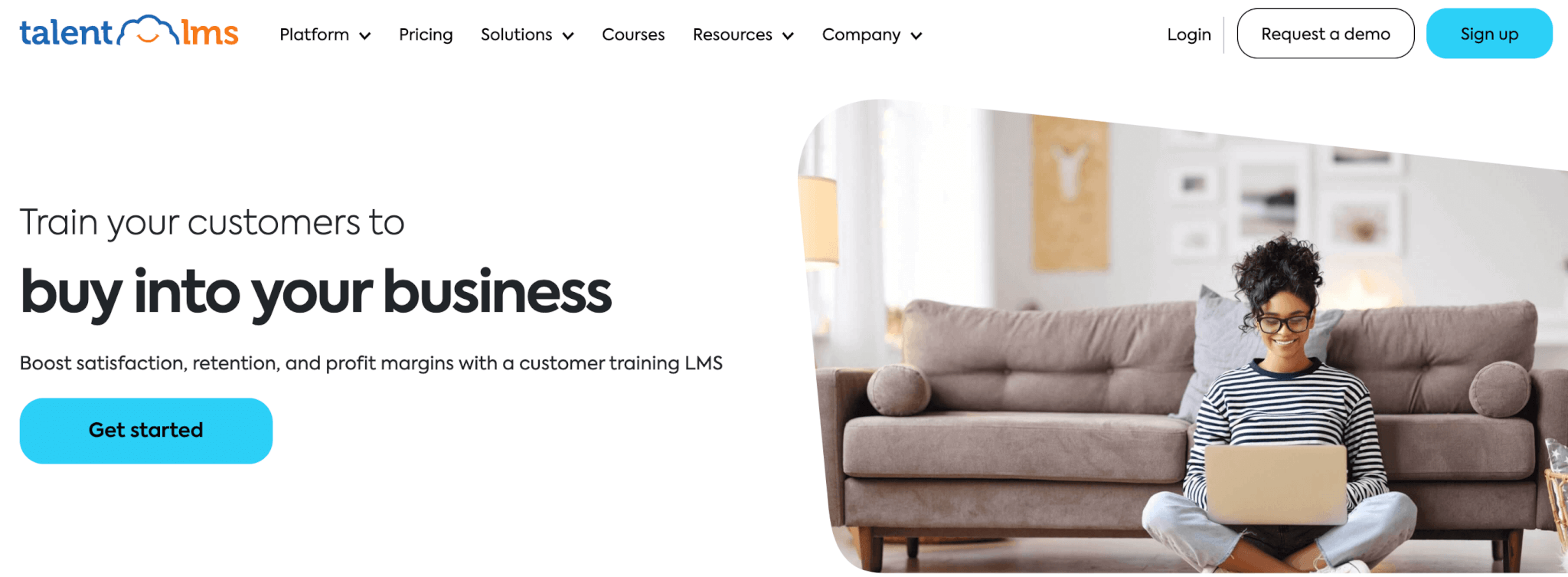
TalentLMS offers an intuitive learning platform that allows companies to create and deliver customer training courses quickly. The platform also supports gamification, assessments, and certifications, enhancing customer interaction and retention. Moreover, TalentLMS integrates with popular tools like Zapier and Salesforce, making it easier for companies to streamline their customer training efforts.





STARTING PRICE: Free (Limited to 5 users and 10 courses)
Investing in a comprehensive solution like a customer training LMS is the best way to create, deliver, streamline, and even sell your customer training program. An LMS consolidates different tools into one platform, offering additional benefits in streamlining, scaling, and monitoring your program that standalone tools lack.
Let’s see more reasons why you should opt for a Learning Management System.
15,000+ brands trust LearnWorlds to train their people, partners & customers.
Start a FREE Trial1. All-in-One Tool
It’s easy to see how a customer training platform combines the functionalities of multiple tools and ends up being the most simple and effective solution.
An LMS doesn’t cater for course creation aspects only, but also for content delivery, user management, and reporting.
2. Multimodal Delivery
Most Learning Management Systems support multiple training delivery methods, which is essential for offering your customers more options.
Hold live webinars or record them and offer them on demand, build a knowledge base, create self-paced training courses with diverse learning material, or even blend synchronous with asynchronous learning – anything is possible.
3. AI Assistant
An AI assistant will help you develop high-quality content, edit and polish, or repurpose existing resources into new formats. This is a game changer in customer education where you need to update and release new content frequently. AI also helps with data analysis (for example, analyzing support tickets) and with course planning, ensuring you create targeted training resources.
4. Centralized Academy Management
Multiple schools functionality (similar to branches and multi-tenancy) allows businesses to create and manage multiple learning environments or “schools” under a single LMS.
It’s useful when serving different customer segments or having diverse product lines, offering customized training experiences for each audience.
Additional features like user roles, access controls, and advanced data security give you peace of mind over who has access to what.
5. User Management
Effective user management allows admins to segment learners, assign roles, and track progress. With features like tagging, bulk actions, and automations, you can easily streamline admin tasks for you and personalize the customers’ learning experience.
6. Built-In Content Authoring
Built-in content authoring tools enable you to create or add interactive elements like assessments, simulations, and gamification. This increases learner engagement and retention, making the training process more enjoyable and effective.
7. Website Builder
A website builder allows you to build a custom front-end, ensuring that the platform looks professional and aligns with your branding. For the latter, make sure your platform of choice offers white labeling and not simply customizable templates.
8. eCommerce Capabilities
eCommerce features will enable you to monetize and promote your training courses by offering payment gateways, subscription models, pricing flexibility, and access to email marketing tools.
This feature set is indispensable if you’re looking to scale your academy and especially when offering certification programs.
9. Reporting System
A robust reporting system provides detailed insights into learner performance, engagement, and course completion rates. This allows you to assess your training programs in terms of engagement and learning effectiveness before you can tie those results to your business goals.
10. Integrations
Last but not least, LMSs support several integrations, for instance with CRM platforms to allow for the seamless flow of data between the two systems. This helps track customer engagement with training materials and use that data to improve customer support, personalization, and upselling opportunities. Further integrations allow for enhanced functionality and improved workflows.
Customer training is a card up your sleeve for an unparalleled customer experience that fosters customer loyalty and prevents churn. Choosing the right customer training tool is essential to ensuring your customers feel confident and empowered.
With so many options available, finding a solution that fits your specific needs is as challenging as it is essential.
LearnWorlds stands out as the top choice, offering everything from content creation to reporting and monetization. It’s an all-in-one platform that scales with your business, making it easier to deliver impactful training and grow customer satisfaction.
15,000+ brands trust LearnWorlds to train their people, partners & customers.
Start a FREE TrialFurther reading you might find interesting:
Androniki is a Content Writer at LearnWorlds sharing Instructional Design and marketing tips. With solid experience in B2B writing and technical translation, she is passionate about learning and spreading knowledge. She is also an aspiring yogi, a book nerd, and a talented transponster.

